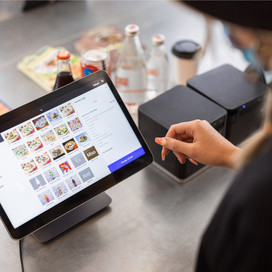Table of contents
Not every small business is about unique, show-stopping ideas. Though the concept of the entrepreneur is underpinned by a ‘Eureka!’ moment, that’s simply not always the case in reality. If you want to give business ownership a go but don’t have an idea that’s ready to market, or if you just want to operate within a safety net where support and reputation are already built-in, a franchise could be a great choice.
What is a Business Franchise?
Simply put, a franchise is when a larger company ‘leases’ its name, products and services to a third party who then offers these to the public in return for a cut of the profit. While this may seem like the brand is employing a person as a location manager, the responsibility of customer service, financial management and product management is all down to the franchisee.
It is a contractual agreement, at the end of the day. The length of franchise licences varies, but there are usually always options to renew.
According to IbisWorld, in 2021 there were more than 90,000 franchise units across the country, valued at over $180 billion.
Franchisee vs Franchisor
A franchising business, also known as a ‘franchisor’, is the original owner of the brand, services and products in which a ‘franchisee’ can invest. This franchisee can be an individual or a business entity in its own right. By investing in the franchisor, the franchisee can trade under their name and offer the same products and services. With the support, experience and proven business experience of the brand behind them, franchisees can start up their own branch of the franchisor’s business in no time at all.
Franchising allows you to enjoy owning a retail site, having your own team and running a branch of a business, but it also restricts you to the broader processes of the brand you’ve bought into. There are many other pros and cons to consider before taking the plunge as a franchisee.
Pro and Cons of Franchising
There are plenty of positives and negatives to consider when starting out as a franchisee. If starting a small business from scratch isn’t your forte, your strengths may lie in a franchise business instead. Here’s what you need to think about before moving forward:
Pros:
- You’re buying into a proven brand. This is especially true if you choose to work with some of the world’s biggest franchisors like McDonald’s and Subway. You get the backing and support from a brand whose track record has been profitable, and whose future prospects look bright. For many, this is reason enough to choose the path of a franchisee.
- Proven concepts. In the same way as above, you don’t need to worry about coming up with a winning concept — it’s all done for you. Any sizeable future innovations will also come from the franchisor, which alleviates the pressure to think creatively on your feet. So long as you have the motivation and the energy to succeed, franchising could work for you.
- Quick growth. With a brand like Subway, for example, you can bet you’ll have new and return customers visiting your store throughout the entire day. With a good brand and a good location, growing a franchise can take far less time than an independent company.
- Support. The level of support on offer varies from business to business, but there’s usually plenty of assistance (financial and otherwise) to get your franchise off the ground — it’s in the franchisor’s interest at the end of the day. Some businesses will have you complete a crash course, covering everything from book-keeping to running social media, while others may offer 24-hour support or your very own personal franchise coach. In any case, compared to starting an independent business on your own, a franchise most definitely gives you a guiding hand and plenty of experience-based knowledge to take advantage of.
- Financial help. As well as the helpful funds your franchisor may offer you, banks tend to favour franchisees over startups that don’t have the backing of a big brand. This means even if you need to take out a loan to get things running, the chances of having your request granted are much higher.
- Location, location, location. Finding and securing a location is one of the biggest initial costs when starting a business. Many an entrepreneur has found themselves settling for less than their dream location because of costs and other logistics. With a franchisor behind you, you have the experience and funds to secure a prime-location branch on the high street or local shopping centre. Franchisors will think very carefully about where to place their next venture.
Cons:
- Their way or the highway. Brands have their own way of doing things — with lots of compulsory documentation, training and guidance to get you on the same page. If you do anything beyond the business model of your franchisor, you could face a penalty or have your franchisee licence cancelled. With this in mind, it’s unlikely that creative individuals will be happy working so rigidly to someone else’s concept. If you want the room to stretch your entrepreneurial wings, think carefully before jumping in.
- It can be hard work. This is where franchising really doesn’t differ from running your own business. Though your franchisor will help out, train you up and secure you a great location, you’ll need to work the long hours, manage your team and develop strategies to make it a roaring success. Unlike an independent business, you may also feel like you constantly need to be working towards goals and figures to appease your franchising partner. While targets are necessary even when running your own business, having a franchisor involved can add to the pressure.
- You’re a link in a chain. And there’s no telling who could break that chain. Even with solid backing behind you, nobody can rule out the possibility that a franchisor will stumble upon hard times. No matter how hard you’ve worked, if the brand fails, so does your franchise. As with every business opportunity, there’s risk involved.
- Setup fees. Franchisors will ask you for an initial investment to cover the cost of setting up. This ranges from the lower thousands to the hundreds of thousands. After this is sorted, you’re then required to pay royalty fees in full and on time to your franchisor. This setup isn’t going to work in the long-term if you feel uncomfortable passing your start-up money and earnings to a business that isn’t your own.
Famous Franchises
While some franchisees might say McDonalds or KFC are great franchises to invest in, they’re also extremely popular – and it’s a lengthy process to get involved. Fortunately, there are plenty of other options that are much easier to come by. Here are some of Australia’s best known, and most available, franchises:
- Poolwerx– Australia’s largest cleaning franchise has over 100 retail stores and more than 300 mobile service vehicles. Average cost for a franchise is between $50,000 and $100,000.
- Jim’s Mowing – one of the largest handyman services in Australia. Costs anywhere from $20,000 – $50,000 to start depending on what equipment you require.
- Gutter-Vac is a gutter cleaning service that has more than 80 franchisees across Australia. Cost to start a franchise is between $80,000 and $120,000.
- Coffee Club is the largest Australian café group, with about 400 locations in nine countries. A franchise will cost you between $450,000 and $700,000 to set up.
- Subway is Australia’s largest restaurant brand, with over 1,350 stores. It serves nutritious subs, salads, and wraps and if you want to start a franchise, it will cost anywhere from $195,000 to $360,000 to start.
![]()











